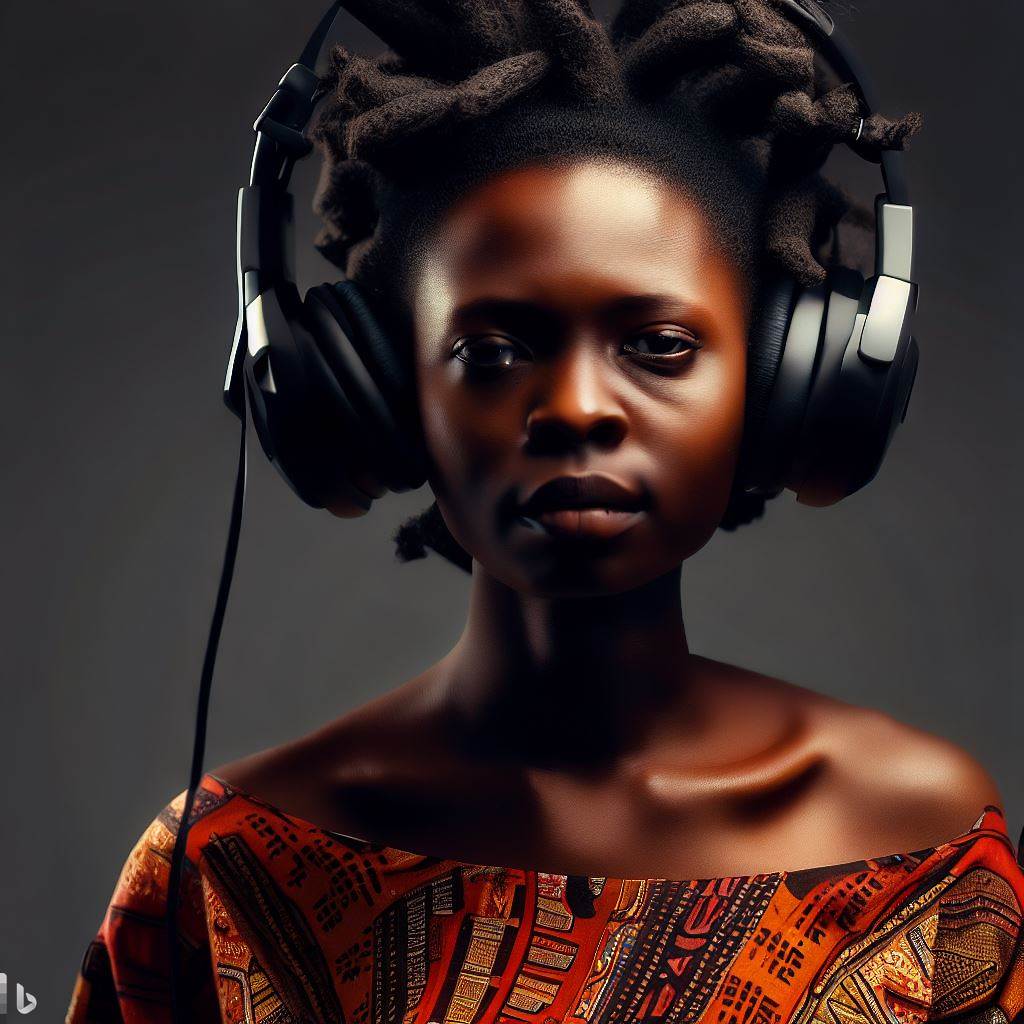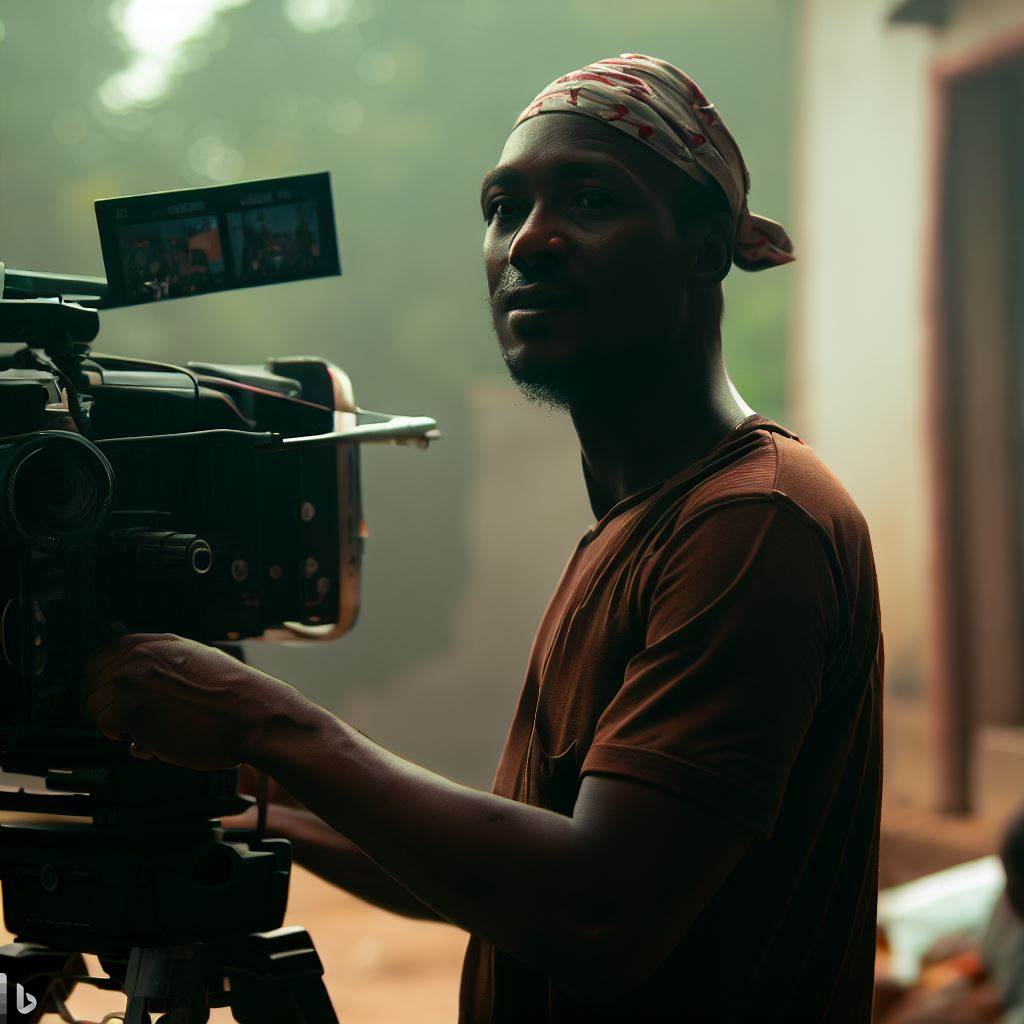Introduction
Since the emergence of digital media, the Nigerian music industry has experienced an impact of significant transformation.
Digital media refers to the use of electronic devices and platforms that enable the creation, distribution, and consumption of music content.
In Nigeria, the music industry has traditionally relied on physical distribution, such as CDs and tapes.
However, with the advent of digital media, artists can now release their songs online, reaching a wider audience both locally and globally.
This shift in distribution has resulted in increased visibility and accessibility for Nigerian musicians.
Online music platforms like YouTube, Spotify, and Apple Music have made it easier for artists to showcase their talent and connect with fans.
The internet has also provided opportunities for independent artists to self-promote and release their music without the need for major record labels.
Digital media has not only impacted the distribution of music but has also revolutionized the way Nigerian musicians create and produce their music.
With the availability of digital recording software and equipment, artists can now create high-quality music from the comfort of their homes or studios.
This has democratized the music production process, enabling aspiring musicians to compete on a level playing field with established artists.
Furthermore, social media platforms like Instagram, Twitter, and Facebook have played a crucial role in promoting Nigerian music.
Artists can engage with their fans directly, share updates about new releases, and build a loyal fan base.
This direct interaction has fostered a sense of community between artists and fans, contributing to the growth and success of the Nigerian music industry.
In the end, the emergence and growth of digital media have revolutionized the Nigerian music industry. It has changed the way music is distributed, created, and promoted.
With digital platforms becoming the new norm, it is essential for Nigerian musicians to embrace digital media to thrive in the ever-evolving music industry.
The Evolution of the Nigerian Music Industry
Historical background of the Nigerian music industry
The Nigerian music industry has a rich history that dates back to the pre-colonial era.
Music was an integral part of traditional Nigerian cultures and was used to convey messages, entertain, and celebrate.
During the colonial era, music in Nigeria underwent significant changes due to the influence of Western music.
This led to the rise of highlife music, a fusion of traditional African rhythms and Western instruments. In the 1970s, Afrobeat emerged as a popular music genre in Nigeria, thanks to artists like Fela Kuti.
The Nigerian music industry continued to grow and evolve throughout the 80s and 90s with the rise of juju music and the introduction of music television shows.
Despite its rich history, the Nigerian music industry faced numerous challenges such as piracy, lack of infrastructure, and limited distribution channels.
However, with the advent of digital media, the Nigerian music industry experienced a revolution.
Traditional forms of music consumption in Nigeria
Before the digital era, Nigerians primarily consumed music through traditional means such as radio and cassette tapes.
Radio stations played a vital role in promoting Nigerian music and artists, providing a platform for them to reach a wider audience.
Cassette tapes were the main medium for music distribution, allowing fans to purchase albums and singles.
Music stores also played a significant role in music consumption, with fans buying CDs, DVDs, and merchandise.
Live performances, concerts, and music festivals were popular forms of music consumption, enabling artists to connect with their fans.
Introduction of digital media platforms in Nigeria
The introduction of digital media platforms revolutionized the Nigerian music industry and transformed the way music was consumed.
Online streaming platforms like YouTube, Spotify, and Apple Music enabled Nigerian artists to reach a global audience.
Social media platforms such as Instagram, Twitter, and Facebook allowed artists to engage directly with their fans and build a fan base.
Music websites and blogs became crucial in promoting Nigerian music and providing platforms for emerging artists to showcase their talents.
With the rise of digital media, music distribution became more accessible, reducing the impact of piracy on the industry.
Nigerian artists and record labels also started to embrace digital marketing strategies, utilizing social media and online advertising to promote their music.
The Nigerian music industry has witnessed a surge in international collaborations, with Nigerian artists collaborating with global superstars.
Digital media has also provided opportunities for independent artists and producers to showcase their work without relying on major record labels.
The rise of digital media has led to the monetization of Nigerian music, with artists earning revenue through streaming platforms, licensing deals, and endorsements.
In fact, the evolution of the Nigerian music industry has been greatly influenced by the introduction of digital media platforms.
These platforms have provided opportunities for Nigerian artists to reach a global audience, connect with their fans, and monetize their music.
With the continued growth of digital media, the Nigerian music industry is poised for even more success in the future.
Read: Impact of Modern Tech on Cinematography in Nigeria
The Role of Digital Media in Promoting Nigerian Music
Increased Accessibility of Music through Streaming Platforms
- Streaming platforms have revolutionized the way Nigerian music is accessed and consumed by the audience.
- These platforms like Spotify, Apple Music, and Deezer allow users to stream music whenever and wherever they want.
- With just a few clicks, fans can access a wide range of Nigerian songs, albums, and playlists.
- This increased accessibility has immensely contributed to the popularity and exposure of Nigerian artists.
- Through streaming, artists can reach a global audience, breaking the barriers of physical distribution and boosting their music careers.
- Moreover, streaming platforms provide data and analytics that help artists understand their audience better and tailor their music accordingly.
- The availability of Nigerian music on these platforms has certainly played a significant role in its widespread recognition and success.
Social Media’s Role in Connecting Artists with a Wider Audience
- Social media platforms like Twitter, Instagram, and YouTube have become powerful tools in promoting Nigerian music.
- Artists can directly connect and engage with their fans, sharing updates, music videos, and live performances.
- Social media allows artists to build a loyal fan base, creating a sense of community and fostering a stronger connection.
- Nigerian artists actively use hashtags, trends, and challenges to promote their music, gaining massive visibility.
- These platforms enable artists to go viral, reach a wider audience both locally and internationally, and gain international collaborations.
- Fans also play a significant role by sharing content, creating buzz, and actively participating in the promotion of Nigerian music.
- Social media has empowered artists to independently market their music and gain recognition on a global scale, without relying solely on traditional media platforms.
Emergence of Music-centric Apps and Websites
- The emergence of music-centric apps and websites has provided Nigerian artists with additional promotional opportunities.
- Apps like Boomplay, Notjustok, and Spinlet focus solely on Nigerian music, showcasing the vast talent in the industry.
- These platforms not only provide a platform for artists to upload their music but also offer features like artist profiles, music charts, and recommendations.
- Music-centric websites like BellaNaija, Pulse, and Naijaloaded provide news, reviews, and exclusive interviews of Nigerian artists.
- These platforms actively promote Nigerian music, giving artists exposure and a chance to connect with a wider audience.
- Music-centric apps and websites serve as valuable resources for fans to discover new talent and stay updated with the latest music trends.
- The growth of these platforms has greatly contributed to the visibility and success of Nigerian music and artists, driving the industry forward.
In short, digital media has significantly shaped the Nigerian music industry by increasing accessibility through streaming platforms, connecting artists with a wider audience through social media, and providing additional promotional opportunities through music-centric apps and websites.
These developments have brought Nigerian music to the global stage, gaining recognition and appreciation worldwide.
As technology continues to advance, it is expected that the impact of digital media on Nigerian music will only continue to grow, opening up new opportunities for artists and revolutionizing the way music is consumed and enjoyed by fans.
Read: The Journey to Becoming a Cinematographer in Nigeria
Transition in Music Distribution and Sales
As technology continues to evolve, the music industry has experienced a significant shift in how music is distributed and consumed.
This transition has had a profound impact on Nigerian music, both positive and negative.
Decline of physical album sales and rise of digital music consumption
In the past, physical album sales were the primary source of revenue for Nigerian artists.
CDs and cassette tapes were sold in music stores, and fans would purchase these physical copies to enjoy their favorite music.
However, with the advent of digital media, the demand for physical albums has decreased considerably.
Today, consumers prefer to access music through digital platforms such as streaming services and online downloads.
This shift has led to a decline in physical album sales and a corresponding rise in the consumption of digital music.
Fans now have the convenience of accessing a vast library of songs on their smartphones or computers, eliminating the need for physical copies.
Impact of online music stores on revenue generation for Nigerian artists
While the decline in physical album sales may seem detrimental, the rise of digital music consumption has created new opportunities for Nigerian artists to generate revenue.
Online music stores and streaming platforms have become major sources of income for musicians.
Platforms such as iTunes, Spotify, and Boomplay allow artists to sell their music directly to fans without the need for a physical distributor.
This direct-to-consumer approach enables artists to retain a larger share of their earnings, as they no longer have to split profits with intermediaries.
Furthermore, these platforms also provide artists with valuable data insights, including information about their fan base and popular streaming locations.
This data allows artists to better understand their audience and tailor their marketing and promotional efforts accordingly.
Challenges faced by artists in adapting to digital distribution
While digital distribution offers numerous benefits, Nigerian artists have had to face several challenges in adapting to this new landscape.
One of the main obstacles is piracy. With digital media, it has become easier for unauthorized individuals to copy and distribute music without the artist’s consent.
This widespread piracy significantly impacts an artist’s revenue, as their works are often accessed and enjoyed for free.
Additionally, the cost of producing high-quality digital content can be prohibitively expensive for some artists.
To compete in the digital marketplace, artists need to invest in professional recordings, music videos, and promotion. These costs may pose a challenge for up-and-coming artists with limited financial resources.
Furthermore, navigating the intricacies of digital platforms and understanding the algorithms that drive visibility and discoverability can be overwhelming for some artists.
Without proper knowledge and guidance, artists may struggle to make their music stand out in the crowded digital space.
In essence, the transition from physical album sales to digital music consumption has brought significant changes to the Nigerian music industry.
While physical album sales have declined, online music stores and streaming platforms have opened up new revenue streams for artists.
However, challenges such as piracy and the cost of digital content production continue to impact Nigerian artists.
Striking a balance between embracing digital distribution and mitigating these challenges is crucial to the growth and success of the Nigerian music industry.
Read: How Nigerian Artists are Making Waves Globally

Empowering Independent Artists and Aspiring Musicians
Breaking barriers to entry through digital platforms
- Digital media has revolutionized the music industry, allowing independent artists and aspiring musicians to enter the scene.
- Unlike traditional platforms, digital platforms like social media and streaming services have low barriers to entry.
- Independent artists no longer have to rely on record labels or physical distribution channels to share their music.
- Through digital platforms, artists can easily upload their music, create a social media presence, and engage with their audience.
- This democratization of the industry has opened doors for countless talented individuals who otherwise would go unnoticed.
Tools and resources available for independent musicians
- Digital media provides independent musicians with a wide range of tools and resources to enhance their music.
- Music production software and digital audio workstations enable artists to create professional-grade recordings from their homes.
- Video editing software allows musicians to create visually appealing music videos without the need for expensive production teams.
- Social media platforms offer opportunities for artists to connect directly with their fans, promote their music, and arrange live performances.
- Online distribution services allow independent musicians to reach a global audience through streaming platforms like Spotify and Apple Music.
Success stories of artists who gained fame through digital media
- Digital media has been instrumental in launching the careers of many Nigerian artists who have now achieved international fame.
- One example is Burna Boy, who gained popularity through the online release of his music and leveraging social media platforms.
- Another success story is Niniola, who used digital media platforms to showcase her unique sound and gained recognition globally.
- Yemi Alade is another artist who utilized YouTube and other digital platforms to share her music, ultimately becoming a household name.
- These success stories demonstrate the power of digital media in amplifying the reach and impact of Nigerian musicians.
By breaking down barriers to entry, providing essential tools and resources, and facilitating the success stories of artists, digital media has empowered independent artists and aspiring musicians in Nigeria’s music industry.
Through digital platforms, artists can showcase their talent, build a fan base, and connect directly with their audience.
As more artists use digital media to propel their careers, the Nigerian music scene continues to flourish and gain international recognition.
Read: Navigating the Nigerian Art Scene: A Guide
Influence of Digital Media on Nigerian Music Style and Content
Shift in music production and sound engineering techniques
Introduction of digital audio workstations revolutionized music production processes. Producers now have advanced tools to manipulate sounds and create unique musical arrangements.
Digital media enables enhanced post-production techniques like mixing, mastering, and audio effects.
Artists are able to experiment with different soundscapes, resulting in more contemporary Nigerian music styles.
Digital media has had a significant influence on the style and content of Nigerian music. The introduction of digital audio workstations has revolutionized music production and sound engineering techniques.
Producers now have advanced tools at their disposal to manipulate sounds and create unique musical arrangements.
With enhanced post-production techniques like mixing, mastering, and audio effects, artists can experiment with different soundscapes, resulting in more contemporary Nigerian music styles.
Impact on lyrical content, themes, and storytelling
Access to the Internet and social media platforms has amplified voices of Nigerian artists. Artists now have a wider audience, leading to increased creative expression and diverse themes in their music.
Lyrics have become more personalized, addressing societal issues, love, politics, and cultural heritage. Greater lyrical creativity and storytelling ability make Nigerian music more relatable and captivating.
Moreover, digital media, particularly the Internet and social media platforms, has provided Nigerian artists with a wider audience and amplified their voices.
This has led to increased creative expression and diverse themes in their music. Songs now address societal issues, love, politics, and cultural heritage, showcasing the depth of Nigerian artists’ lyrical content.
Fusion of traditional Nigerian sounds with global music trends
Digital media enables the blending of traditional Nigerian music elements with contemporary genres. Nigerian artists can incorporate Afrobeat, highlife, and juju sounds with hip-hop, R&B, and pop music.
Collaborations with international artists have become easier, leading to the crossover of Nigerian sounds globally. The fusion of diverse music styles shapes a unique Nigerian musical identity in the digital era.
The fusion of traditional Nigerian sounds with global music trends is another notable impact of digital media.
With the help of digital tools, artists can blend Afrobeat, highlife, and juju sounds with genres like hip-hop, R&B, and pop music.
This fusion creates a unique blend of traditional and contemporary elements in Nigerian music. Furthermore, digital media has made collaborations with international artists more accessible.
Nigerian musicians can now collaborate with renowned artists from around the world, leading to the global crossover of Nigerian sounds.
This exposure expands the reach and influence of Nigerian music, making it a significant player in the international music scene.
In a nutshell, digital media has had a transformative impact on Nigerian music, both in terms of style and content.
It has enabled a shift in music production and sound engineering techniques, fostering the creation of more contemporary music styles.
The accessibility of digital media has allowed Nigerian artists to reach a wider audience and express their creativity through diverse lyrical content, themes, and storytelling.
The fusion of traditional Nigerian sounds with global music trends and the ease of collaboration with international artists have further shaped the unique Nigerian musical identity in the digital era.
Nigerian music continues to thrive and evolve, thanks to the influence of digital media.
Copyright and Piracy Issues in the Digital Era
Challenges faced by Nigerian musicians regarding copyright protection
- Nigerian musicians encounter numerous challenges when it comes to protecting their copyright in the digital age.
- One of the major challenges is the ease with which their music can be copied and distributed without permission.
- Illegal downloads and unauthorized streaming platforms have made it difficult for artists to control their content.
- The lack of a centralized system for copyright registration in Nigeria further exacerbates the problem.
- This lack of protection discourages many artists from creating and releasing their music digitally.
The rise of digital piracy and its impact on artists’ revenue
- The rise of digital media has led to a significant increase in piracy, causing a decline in artists’ revenue.
- Piracy allows users to access and distribute music without compensating the artists.
- Nigerian musicians rely heavily on revenue from music sales, and piracy undermines their ability to earn a living.
- As piracy continues to thrive, artists find it challenging to sustain their careers and invest in their craft.
- The loss of revenue also affects the quality and production value of Nigerian music.
Efforts to combat piracy and protect artists’ rights
- Despite the challenges, efforts are being made to combat piracy and protect Nigerian artists’ rights.
- The Nigerian Copyright Commission (NCC) is the regulatory body responsible for addressing copyright infringement.
- The NCC conducts raids and seizures of pirated materials and takes legal action against copyright offenders.
- Artists are also taking measures to protect their music, such as utilizing digital rights management systems.
- Collaborations between music platforms, artists, and copyright agencies are being fostered to curb piracy effectively.
In general, Nigerian musicians face significant challenges in protecting their copyright in the digital era.
The ease of copying and distributing music without authorization has led to a rise in piracy, resulting in a decline in artists’ revenue.
However, efforts are being made by regulatory bodies, artists, and music platforms to combat piracy and protect artists’ rights.
It is essential to establish a robust copyright protection system to ensure the sustainability and growth of the Nigerian music industry in the face of digital media.
See Related Content: The Role of Scriptwriters in Nollywood’s Global Success
Conclusion
Recap of the impact of digital media on the Nigerian music industry
Digital media has revolutionized the Nigerian music industry, providing artists with unprecedented opportunities for exposure and success.
Social media platforms and streaming services have allowed Nigerian musicians to reach a global audience and connect with fans in ways that were previously impossible.
Additionally, digital media has allowed for the democratization of music production and distribution, enabling independent artists to thrive.
Acknowledgment of the opportunities and challenges presented by digital media
While digital media has undoubtedly brought numerous advantages to the Nigerian music industry, it has also posed challenges.
The ease of online distribution has led to an oversaturation of music in the market, making it harder for artists to stand out.
Furthermore, the rise of illegal downloads and streaming piracy has affected the revenue streams of many artists.
Closing thoughts on the future of Nigerian music in the digital age
As the Nigerian music industry continues to evolve in the digital age, it is crucial for artists and stakeholders to adapt and embrace new technologies.
Collaboration between artists, digital platforms, and policymakers is necessary to address issues such as copyright infringement and revenue distribution.
With proper regulation and innovation, the future of Nigerian music looks promising in the digital era, providing more opportunities for talented artists to shine on international platforms and reach a wider fanbase.




